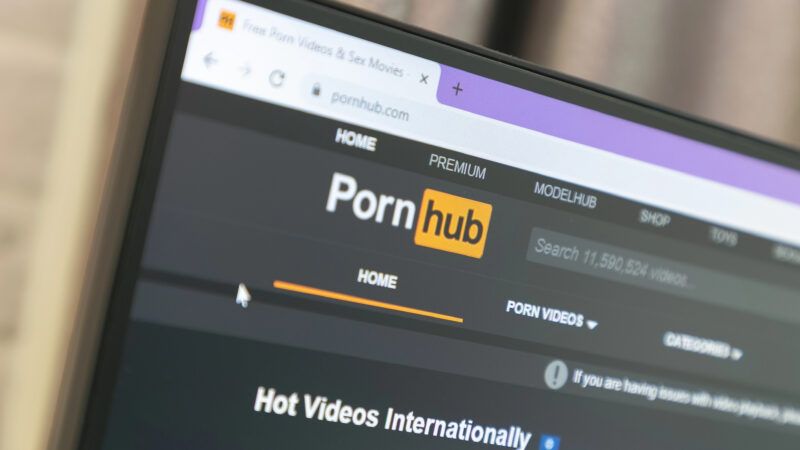The Federal Trade Commission Goes After Pornhub
Plus: Nepal bans social media platforms and kills protesters, MAGA's war on the tech industry intensifies, and more...

It's become abundantly clear that government attacks on pornography are often flimsy pretenses for grabbing more control of the internet broadly. But the Federal Trade Commission (FTC) and Utah last week reminded us that such attacks can also be good old-fashioned money grabs, too.
The FTC is proposing that Aylo, the company behind Pornhub and other popular porn distribution platforms, be ordered to pay the state of Utah $5 million. In a new complaint filed with the U.S. District Court for the District of Utah, it accuses Aylo of violating the FTC Act and Utah's Consumer Sales Practices Act by failing to stop Pornhub users from uploading what the FTC calls "non-consensual material" (NCM) and "child sexual abuse material" (CSAM).
You are reading Sex & Tech, from Elizabeth Nolan Brown. Get more of Elizabeth's sex, tech, bodily autonomy, law, and online culture coverage.
The FTC's Allegations
I'm not going to use the FTC's preferred terms here, because I think they're misleading and inflammatory. The term "child sexual abuse material" suggests truly horrifying and disgusting things—and indeed, child pornography would fall under the CSAM rubric. But CSAM also refers to any sexualized imagery depicting anyone under age 18, even when a minor takes the photo or video themselves or knowingly allows another underage person to take it. Lumping together these drastically different types of content into one term is pure propaganda, designed to make people think sites like Pornhub are distributing heinous pornography featuring children when they may have just failed to stop the upload of a video featuring a 17-year-old.
And yes, it should still be illegal to knowingly distribute porn featuring minors even when these minors are older teens. But accidently failing to distinguish between a 16- and an 18-year-old is a very different problem than intentionally allowing the distribution of obvious child porn, and I think we should acknowledge that.
It's not even clear if the material the FTC is targeting actually is what it calls CSAM or NCM. In its complaint, the FTC spends a lot of space listing Pornhub tags and titles such as "helpless teens," "internet creeper," "shower spy cameras," and "shamed sluts." The FTC also specifically points out a video "which was marketed as an 'underground secret society of men who buy and sell boy slaves on the black market.'"
No one let FTC workers visit the Netflix homepage. We'll soon have an investigation into how Netflix is promoting murder and corporate espionage and witchcraft.
Obviously, the existence of tags and promos like those does not mean that these videos feature literal boy slave markets or "shamed sluts." Porn, like other types of entertainment media, often relies on fictional characters and scenarios.
Many people will find fictional depictions of rape, "shower spy cameras," and sex with underage teens to be gross, distasteful, or wrong. But that doesn't mean it's illegal.
Why Now?
Of course, some of the content users uploaded to Pornhub may have actually been illegal. The FTC notes the "well-publicized example" of Pornhub including content from a company called GirlsDoPorn, which was found to have engaged in deceptive practices with performers, telling them their content would be for private use only and then posting it online. (To be clear, there's no proof that Pornhub knew about these consent violations. Pornhub took down GirlsDoPorn content when the company was criminally indicted.) And the agency notes some audits by media companies that claim to have found illegal material—though these audits also seem to have relied a lot on taking tags at face value.
In any event, Pornhub has tightened up its content rules in recent years. Amid uproar from credit card companies and The New York Times in 2020, the platform removed content posted by non-verified users and made major changes to help crack down on illegal content. And most of the things that the FTC objects to are policies in place before 2020.
The fact that the FTC and Utah are going after the company for policies it changed roughly half a decade ago suggest this isn't actually about righting some ongoing wrong but about wringing money out of a company that officials know will have few defenders (especially if authorities frame this as a matter involving "child sexual abuse material").
"The proposed order settling the FTC and Utah allegations imposes a $15 million penalty against Aylo, which will be suspended after payment of $5 million to Utah," says the FTC press release. If it fails to follow any of the proposed conditions of the settlement, it will owe an additional $10 million.
Aylo has since agreed to the settlement.
Porn, Google, and the 'Unfair Practices' Racket
The fact that the FTC is intervening here at all is odd, to say the least.
Distributing child pornography is a crime. If a web platform is knowingly distributing child pornography, the proper recourse is for the Department of Justice to bring a criminal case.
The fact that no criminal case has been brought suggests there's not actually enough evidence to successfully prosecute the claims the government is making. But the Trump administration wants to be able to say it's doing something to target online porn, so it's using the FTC's more vague mandates to do the dirty work.
The agency got involved here by claiming that Pornhub engaged in "unfair" and "deceptive" practices, since it claimed to have robust controls against spreading illegal or non-consensual porn.
This has been a trend recently—and not just against porn purveyors. We've seen a wave of government attacks on tech companies under the guise of consumer protection and preventing "unfair practices."
For instance, FTC Chairman Andrew Ferguson emailed Alphabet CEO Sundar Pichai last week saying that "Alphabet may be engaging in unfair or deceptive acts or practices," in violation of the FTC Act. The alleged infraction: intentionally blocking messages from Republicans as spam—a bit of misinformation that's been circulating on the right for years, even though the Federal Election Commission found "no reason to believe" that the company intentionally skewered its spam filters and even though a federal court threw out a Republican National Committee lawsuit over alleged email bias.
On the Democratic side of the aisle, Minnesota Attorney General Keith Ellison has accused TikTok of engaging in "deceptive and unfair" practices for using such features as infinite scroll, beauty filters, and livestreaming where people can pay creators. And New Mexico accused Meta of unfair practices for not blocking minors from seeing some sexual content.
The criteria for consumer protection violations may be more open to interpretation than the criteria for criminal violations, which makes state and federal trade laws ripe for abuse against high-profile companies that are not violating the law but politicians nonetheless want to condemn.
19 Killed in Protest Over Nepalese Social Media Bans
The Nepalese government last week banned more than two dozen social media platforms, alleging that they failed to meet registration requirements. Instagram, Facebook, YouTube, WhatsApp, and LinkedIn are among the 26 prohibited websites.
A Monday protest over the ban turned violent, with Nepalese security forces killing at least 19 protestors, according to the BBC.
"The government has said social media platforms need to be regulated to tackle fake news, hate speech and online fraud," the BBC reports. "Nepal's government has argued it is not banning social media but trying to bring them in line with Nepali law."
NatCons Against AI
At the National Conservatism Conference last week, the nationalist right's hatred of tech companies was unmistakable. The University of New Mexico psychologist Geoffrey Miller called artificial intelligence companies "betrayers of our species, traitors to our nation, apostates to our faith, and threats to our kids" and said the AI industry was "by and large, globalist, secular, liberal, feminized transhumanists" who "want mass unemployment," reports Tina Nguyen at The Verge.
"The tech right and the MAGA populists had united briefly to get an anti-woke Trump into the White House, and as their coalition fractured, Vice President JD Vance, a Peter Thiel protege who's attended NatCon multiple times, tried to serve as a bridge between them," notes Nguyen. "But this year's NatCon has made it clear that the factions are no longer on the same page," with "nearly half of the conference's panels" focused on technology and its allegedly damning effects.
No right-leaning anti-tech eruptions would be complete with Sen. Josh Hawley (R-Mo.), of course. "Only humans ought to drive cars and trucks," he told the NatCon crowd in a September 4 speech bemoaning AI.
Hawley's "sentiment isn't only anti-innovation, it's a dangerous line of thinking when it comes to the realities of road safety," writes Jennifer Huddleston. "Each year, more than 40,000 Americans die in auto accidents. State-by-state statistics show that nearly 1,000 Missourians—Hawley's constituents—died in auto accidents in 2023. The vast majority of these accidents are caused by human error."
More Sex & Tech News
• House speaker Mike Johnson claimed in a September 4 interview that President Donald Trump was "an FBI informant" against Jeffrey Epstein. Johnson has since walked back that statement, telling The Washington Post that Johnson was "reiterating what the victims' attorney said, which is that Donald Trump—who kicked Epstein out of Mar-a-Lago—was the only one more than a decade ago willing to help prosecutors expose Epstein for being a disgusting child predator."
• Radical feminist author Gail Dines claims that the mere existence of "hypersexualized media" is a civil rights violation because it "infringe[s] on young people's ability to construct their sexuality." This is a new spin on the late 20th century anti-porn feminists' argument that porn was a civil rights violation because it allegedly encouraged violence and sexism against women.
• Why gamers should beware the NO FAKES Act.
• New York City's crackdown on AirBnb failed to accomplish what regulators said it would (surprise, surprise). "Two years after New York City cracked down on Airbnb and other short-term rentals, it is harder than ever to find an apartment to rent in the city," The Wall Street Journal reports.
Today's Image



Show Comments (20)